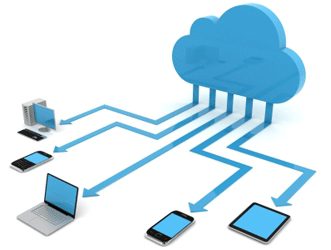Four out of five (81%) business executives believe cloud computing has given them a competitive advantage over their rivals and has helped them react more quickly and effectively to change, according to a report sponsored by NetSuite.
For the study, titled: Disrupt, Collapse, Transform: The Role of the Cloud in Industry Transformation, global industry analyst firm Frost & Sullivan surveyed 1,500 senior executives across multiple industry sectors in the U.S., Australia, Singapore, UK, Japan, Hong Kong and the Philippines.
“The pace of transformation in U.S. industry is accelerating,” said Lynda Stadtmueller, VP of the Cloud Services Program at Frost & Sullivan. “Widespread cloud adoption has helped U.S. companies stay ahead of competition and make the most of the new business models that emerged as a result of the digital revolution. Coupled with shifting economic conditions, the need to constantly innovate and to accelerate time to value, organizations simply need to be more efficient and adaptable in order to survive.”
Almost two thirds (62%) of U.S. respondents describe cloud computing as an opportunity for their business, while 51% said they are leveraging the cloud to access elements of their business management software, with CRM and e-Commerce being the cloud-based business applications they most commonly use.
“Given industries are changing so quickly in such an unpredictable way, companies need to have the ability to adapt quickly to launch new products and services, develop new revenue or business models and access new geographical markets,” Stadtmueller said. “That adaptability is being enabled by cloud computing — it has become a necessary response to the rapid pace of transformation.”
The Four Disruptive Drivers
The advancement of cloud computing has further enabled “disruptive drivers” to motivate businesses to transform, according to respondents. The four largest drivers are:
-
New disruptive competitors (cited by 46% of U.S. survey respondents);
-
Digitalization (37%);
-
New business models (24%); and
-
Productization and servitization (24%).
Additional drivers include evolving customer needs, new regulations impacting specific industries and the increasing costs of doing business.
In the case of disruptive competitors, these market entrants can use cloud computing to establish operations, scale up those businesses and build out their geographic reach, putting pressure on companies that are not presently using cloud computing systems. Up to 59% of U.S. respondents have experienced the entry of a new disruptive competitor into their industry in the past five years.
The second driver — digitalization — is the use of digital channels to do business, sell to customers or transact with suppliers, according to the study. Retail, along with media and entertainment, IT and telecommunications are the sectors most impacted by digitalization.
Due to digitalization, 31% of U.S. respondents expect to change their distribution channels within the next 12 months. Of the companies planning to change these channels, 50% are likely to sell directly to end users, 66% are likely to use new distributors or wholesalers and 58% are likely to sell online.
Cloud computing and other disruptive technologies, such as mobile broadband, 3D printing and low-cost data sensors, have enabled newer business models to emerge such as the mass customization of goods. Companies that can leverage these newer business models have a competitive advantage when jumping into established industries.
The final drivers, productization and servitization, can be further implemented with the assistance of cloud computing, and more businesses are adopting them due to the increased competition throughout industries.
In fact, 59% of U.S. product businesses surveyed either provide services now or think they will need to do so in the future. On the other hand, 47% of U.S. services businesses surveyed either provide products now or think they will need to do so in the future.
“The reality of fast-changing market conditions is that businesses need to stay ahead to generate future revenue and remain relevant,” said Andy Lloyd, General Manager of Commerce Products at NetSuite. “We continue to see a big shift in cloud computing in the U.S., as more businesses of all sizes move beyond initial adoption to using cloud solutions to better recognize and deliver on the needs of their customers and emerging opportunities. Cloud provides greater flexibility, speed and agility for businesses to move quickly as the market changes, enabling them to achieve their broader growth strategies.”













